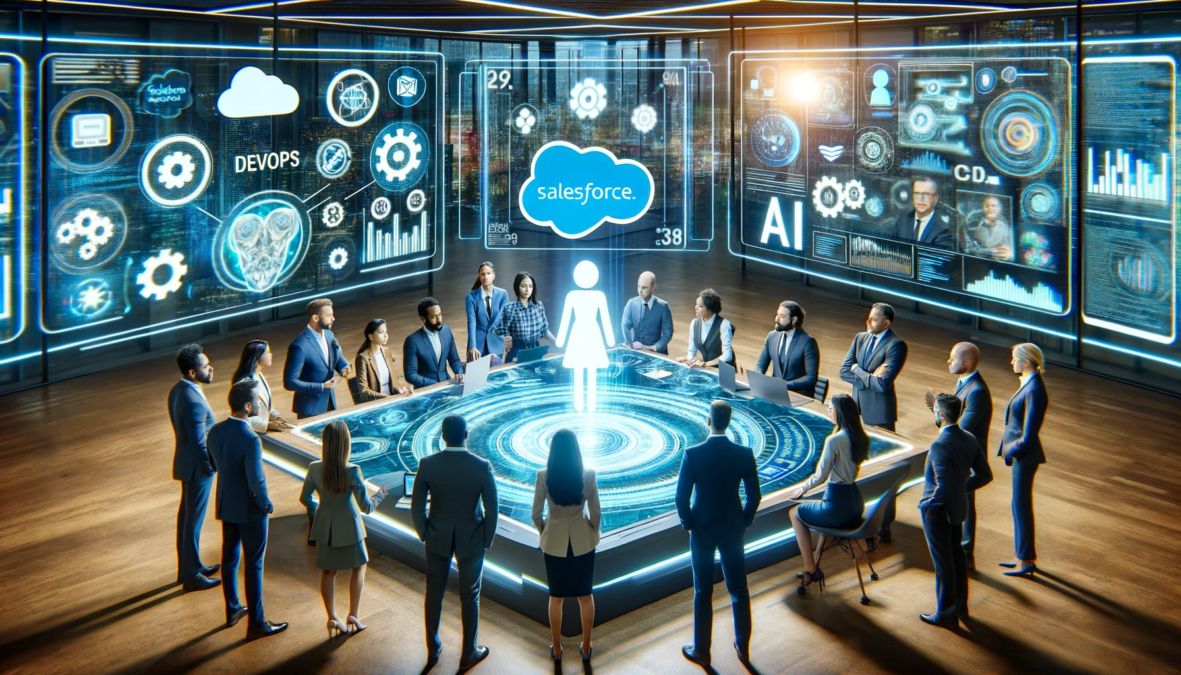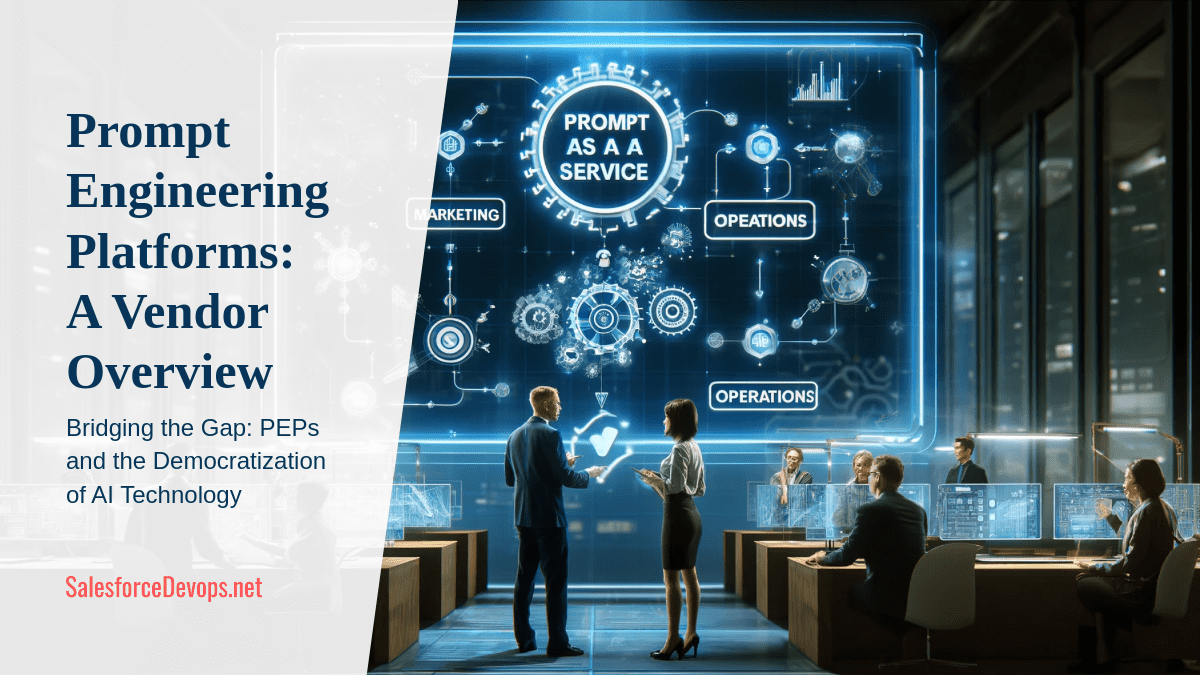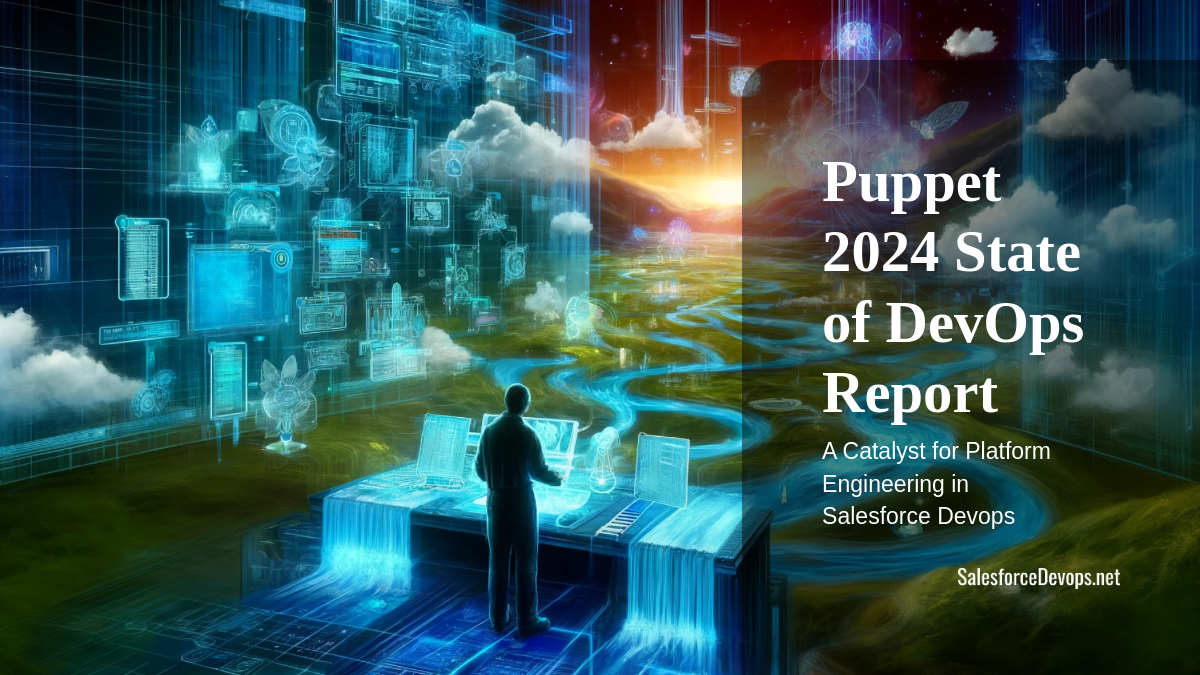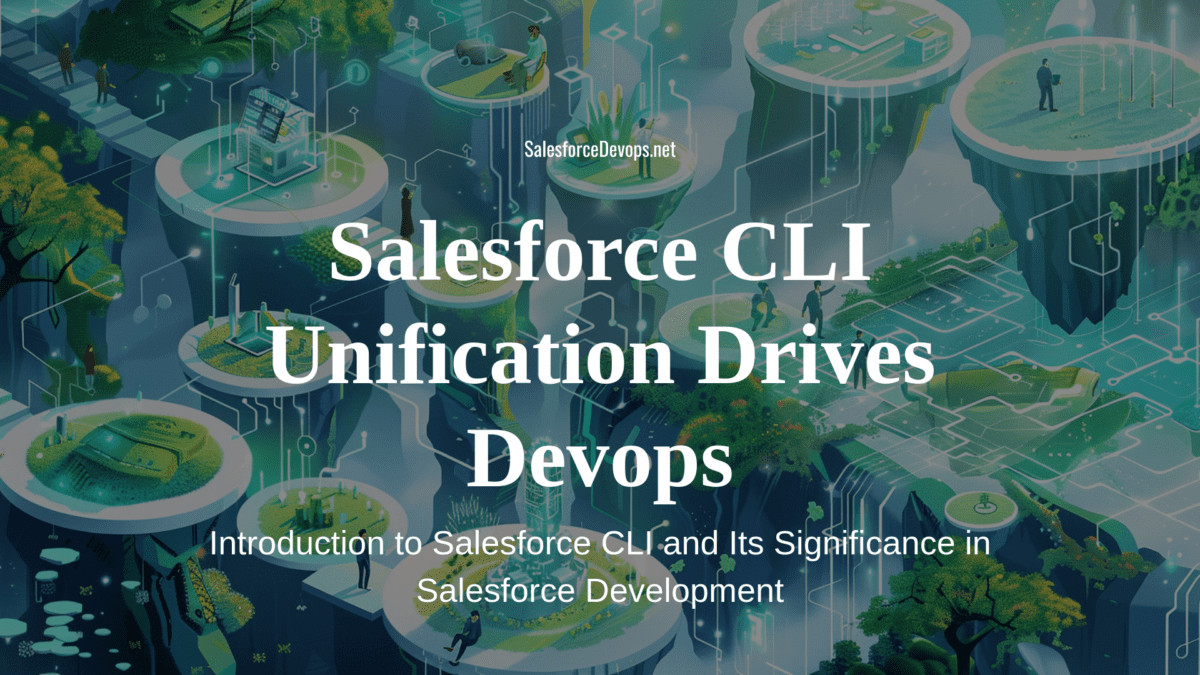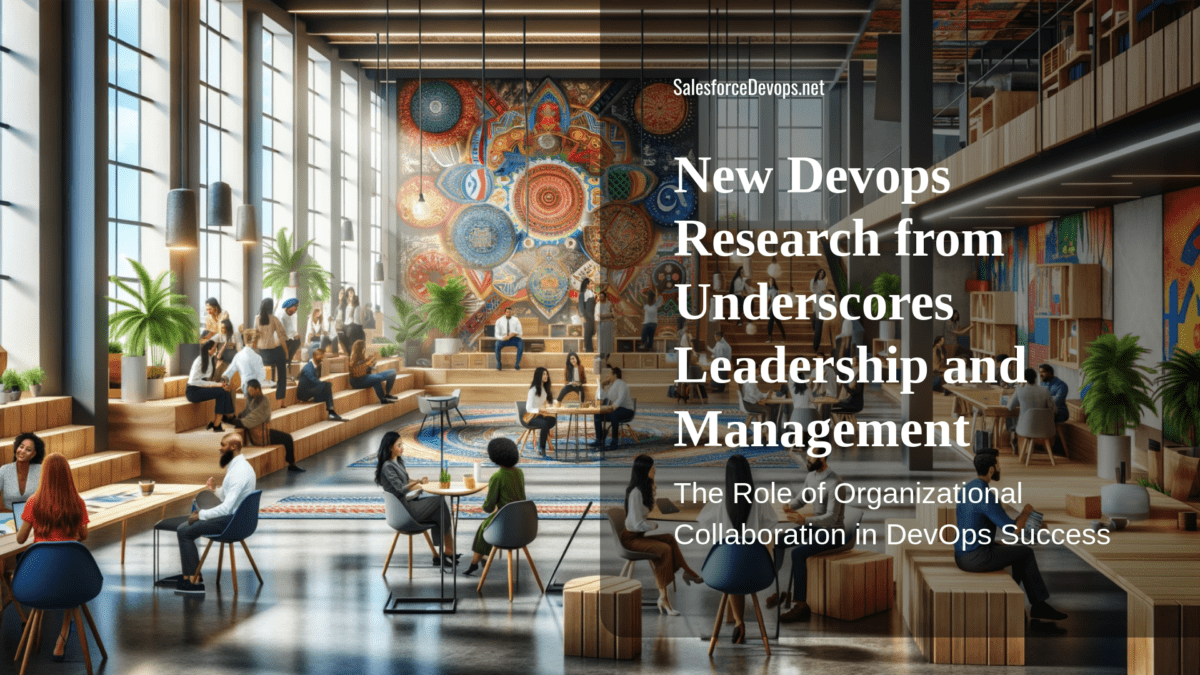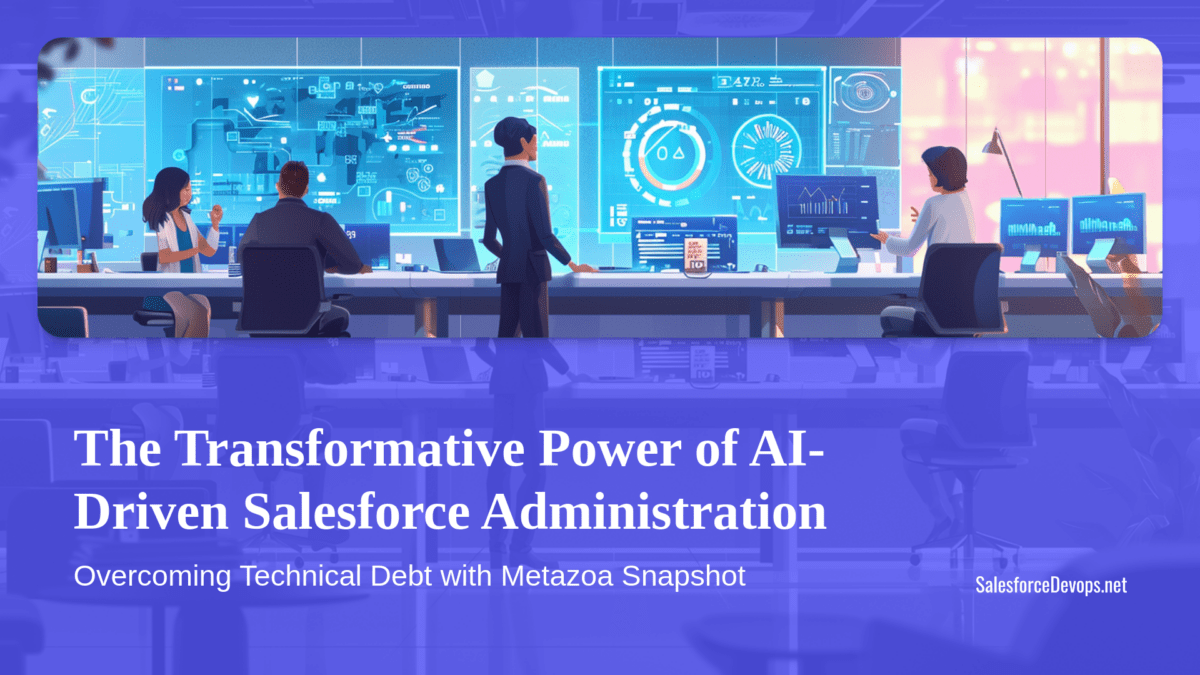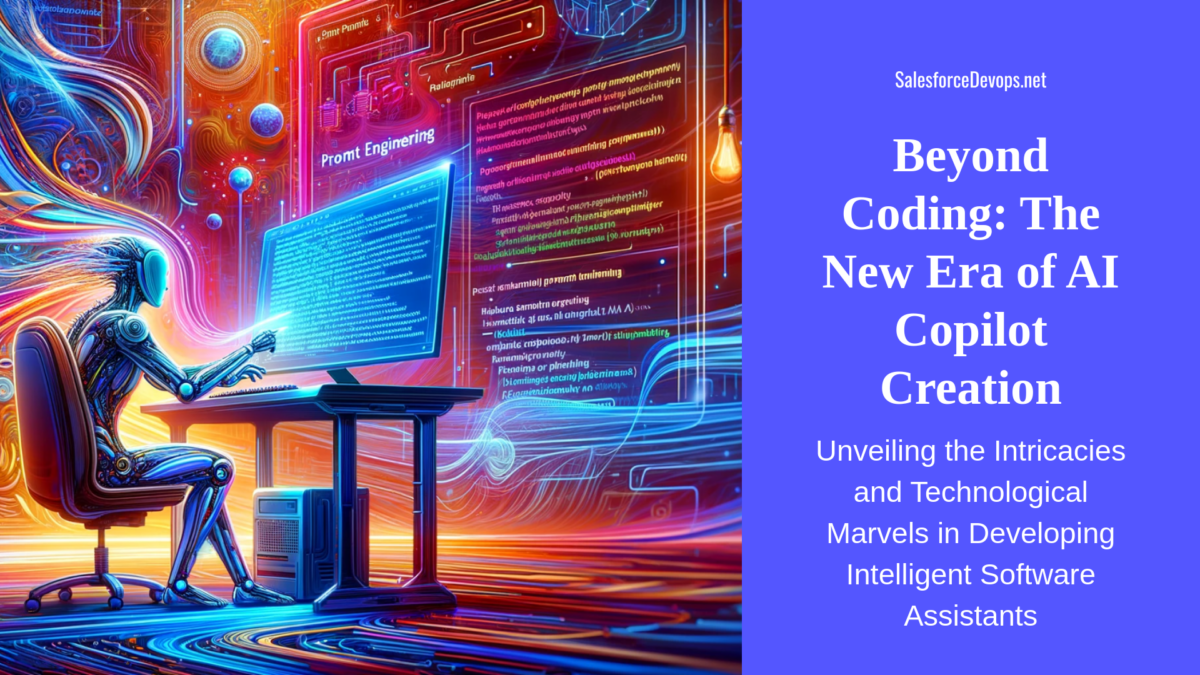Salesforce Devops and AI Retrospective and Outlook 2024
2023 was a rollercoaster year for Salesforce Devops and AI. Salesforce stock plunged early on amidst economic uncertainty but came roaring back thanks to better operating margins and slick marketing around its Einstein AI platform. Meanwhile, chatbots like ChatGPT captivated the public imagination. As we head into 2024, AI promises to transform enterprise software, but can Salesforce deliver on its ambitious vision?
Table of contents
Salesforce Recovery
In late 2022 and early 2023 enterprise IT did not look healthy. Inflation was bad, and economic forecasters were predicting a 2023 recession. Plus, tech stocks had taken a major hit after the pandemic bubble. This time last year every major tech company, except for Apple and Nvidia, was preparing for layoffs. Bay Area tech companies started layoffs in late 2022 and eliminated 100,000 jobs by the end of 2023. And Salesforce, who is a proxy for enterprise IT demand, seemed unsteady with the resignation of Brett Taylor.
And let us not forget how activist investors were circling Salesforce in late 2022, with the threat of demanding more financial performance. This likely precipitated a Salesforce reorganization and angst in the Ohana. Plus, the investors caused a board shakeup with new members appointed in January 2023.
Yet Salesforce emerged stronger than ever. The stock nearly doubled on the back of slick marketing around Einstein, Salesforce’s AI platform. Margins expanded as operations improved. Salesforce seems to have pleased both customers and investors—no mean feat.
The Vendors Lead on Salesforce Devops
My most important 2023 analysis for the Salesforce devops industry is that Salesforce has surrendered the hard devops problems to the vendor ecosystem. The evidence is that the company has added very few metadata management tools since the Salesforce DX flurry in the late 2010’s. And Salesforce metadata management is still more of a black art than a usable platform feature.
Salesforce DevOps Center Diminished
Unfortunately, at the end of 2023, Salesforce DevOps Center has not met expectations. If you spend less than $100,000 per year on Salesforce licenses, DevOps Center is worth a try. There is still hope for recovery, but DevOps Center is overly prescriptive and does not collaborate well with most team structures.
Features Over Management
My analysis shows that the Salesforce Platform team remains focused on rapidly releasing new features for their SaaS products. However, this laser focus on innovation leaves gaps in creating robust tools for enterprise release management and large-scale development operations.
This diverges from Microsoft’s platform strategy, which centers on optimizing developer experience. Microsoft builds platform capabilities keeping the developer workflow in mind. In contrast, Salesforce prioritizes major capability expansions for end business users while not sufficiently upgrading core developer tooling and APIs.
As a result, third-party devops tools have filled critical gaps around Salesforce release management, especially for large complex deployments. Once an enterprise’s annual Salesforce licensing costs exceed $1 million, specialized devops systems become essential to taming complexity at scale. Salesforce devops tooling is also mandatory for regulated sectors like healthcare and finance where Salesforce supports mission-critical apps.
So, while Salesforce races ahead with new features, third-party devops tools have become the enterprise “glue” enabling controlled, reliable releases at massive scale. This explains the continued attention paid to the Salesforce devops vendor ecosystem despite Platform improvements.
Salesforce Devops Industry Leaders
At the end of 2023 Copado is the Salesforce devops revenue leader with over $100 million in 2023 sales. And Gearset, with their effective education and content marketing strategy, also had a good 2023 attracting the most customers with their easy-to-buy SaaS offering. The other major Salesforce devops vendors, including ACCELQ, AutoRABIT/Codescan, Clayton, Elements.cloud, Flosum, Metazoa, Pharos, Prodly, Provar, and Salto all made news and steady progress throughout 2023. Opsera even booked the rare venture capital investment, breaking a 17-month drought.
A specialized system integrator channel also appeared for Salesforce devops. One system integrator, CloudFulcrum, went deep with Copado integrations. Not only did CloudFulcrum specialize in Copado implementations, they have their own system integration platform, OpsBridge, which helps to optimize their deployments.
And in 2023 there were new open-source projects which gained attention, including Cloudity’s SFDX-Hardis and MuseLab’s D2X. Finally, Salesforce devops community leader, Pablo Gonzalez of Salto, launched a free Salesforce CI/CD educational program.
Salesforce Devops and AI
The top Salesforce devops-related vendors who integrated AI into their products include Copado, Elements.cloud, and Metazoa. All these products seek to cut down on admin cognitive load. Both Elements.cloud and Metazoa also add your org metadata to their knowledge sets, allowing for better change impact analysis and technical debt removal. Opsera also announced Hummingbird AI which promises to offer some of the AI and devops benefits mentioned below.
But not all Salesforce devops vendors are on the AI hype cycle. It will be interesting to see which vendors decide to add AI to their messaging, product offerings, and marketing in 2024.
Salesforce’s Rolling Thunder of AI Hype
A pivotal ingredient in Salesforce’s successful 2023 performance was aggressive leadership positioning itself as the enterprise AI platform of the future. The campaign kicked off at March’s TrailblazerDX conference with the unveiling of an expanded Einstein strategy.
Impressively, Salesforce now treats AI Prompts as first-class objects like Flows that can be parameterized and embedded across applications. But despite the fanfare, questions remain around actual breakthrough capabilities versus marketing glitter.
Ever since the spring announcement, Salesforce has maintained a steady cadence of AI-related announcements and platform updates. The highlight was undoubtedly September’s Dreamforce mega-conference and the preview of Einstein 1 capabilities for early 2024. Salesforce also touted growing partnerships with systems integrators to package industry-specific AI solutions.
There was also notable news around allowing customers to bring third-party AI models into Salesforce’s trusted Einstein ecosystem. And just this month, Salesforce revealed vector database search for its AI generation capabilities.
The cumulative impact of this nonstop AI messaging seems clear – financial analysts and industry watchers are now fully bought into the Salesforce vision. Specifically, the idea that Einstein will evolve into a reliable one-stop AI-as-a-service layer integrated across the Salesforce stack.
The promise calls back to the “one throat to choke” philosophy of legacy IT vendors like IBM. For enterprise customers overwhelmed by AI complexity, Salesforce’s “leave it to us” pitch may indeed land. But with other cloud giants like Microsoft, Google and Amazon making similar plays, Salesforce must continue to back up its AI bravado with real-world customer results at scale. The clock is ticking as we enter 2024.
Enterprise AI 2024: Time to Deliver
2024 is shaping up as the long-awaited inflection point for real-world enterprise AI adoption. On the heels of chatbot launches from OpenAI, AWS, and Google, titans like Salesforce have staked bold 2024 delivery timelines for production-grade AI capabilities.
The pressure is on, as the future of enterprise software points toward tighter AI integration under the hood. Top vendors will increasingly incorporate AI enhancement into core products to stay ahead. Salesforce specifically has promised public pilot programs and general availability of key Einstein 1 components in time for March’s TrailblazerDX conference.
So, 2024 is the put up or shut up year. No more AI vaporware – enterprise buyers will demand tangible ROI on any AI investments in 2024. The good news is we already see real promise across domains when AI is thoughtfully applied:
Software Engineering and IT
GitHub Copilot’s code generation abilities have proven 30-60% engineering productivity gains in studies. IT will be the beachhead for enterprise AI in 2024 as CIOs face talent shortages while needing to keep innovating. Strict data governance controls in tools like Copilot Enterprise will ease security concerns.
Marketing
AI text generation for marketing content will be in widespread use soon, despite any IT rules to the contray. But, despite the obvious utility, multimodal AI’s able to generate images, video and audio still remain immature for marketing’s brand control needs. Those creative barriers will start dissolving by mid-2024 as the underlying AI improves. Forward-looking marketing teams will run trials in early 2024 to start charting AI strategy.
Sales and Service Enablement
Mundane documentation for things like sales call summaries will become autonomous, freeing up human bandwidth for judgment and relationship building. Einstein for Salesforce promises more impactful prospect interactions powered by data and AI. The same goes for customer service and support scenarios.
General Productivity
Those who use the latest AI tools, such as custom GPTs, will continue to do their work faster and with higher satisfaction levels. That will increase demand for enterprise-wide AI services with the proper privacy provisions. And the disparity between heavy AI users and those who do not adopt the new skills will become more pronounced throughout 2024. This will force more knowledge workers into AI upskilling situations, which will drive AI educational services.
However, most employers will remain hesitant to foot the ballooning license costs vendors like Microsoft are charging – $30 per seat monthly for Microsoft 365 Copilot subscriptions.
New Enterprise AI Killer Apps for 2024
Expect the AI hype cycle to continue unabated in 2024 as new, mind-blowing capabilities are launched by startups and big IT companies alike. Here are three examples – the IT Companion Chatbot, Virtual Predecessor Assistant (VPA), and Strategic Ideation Partner (SIP) – that are set to revolutionize how businesses approach strategy, operations, and employee engagement.
IT Companion Chatbot
The IT Companion Chatbot marks a significant advancement in AI’s role within the IT sector. Designed to alleviate the cognitive load of IT professionals, this chatbot serves as an always-available assistant, offering real-time support and solutions. By integrating comprehensive technical and institutional knowledge, it aids in problem-solving and decision-making, thereby enhancing productivity and operational efficiency. This tool is particularly crucial for complex environments like Salesforce and devops, where rapid information retrieval and system understanding are essential.
We are already seeing examples of the IT Companion in the market. Amazon Q, which is designed to help AWS practitioners, was announced earlier this month. Salesforce examples include CopadoGPT, ElementsGPT, and Metazoa Snapshot.
Virtual Predecessor Assistant (VPA)
The VPA introduces an innovative concept of leveraging AI for knowledge transfer and onboarding. By analyzing the work patterns, documents, and communications of a role’s previous occupant, VPA creates a digital twin assistant. This assistant helps new employees assimilate role-specific knowledge quickly, reducing the learning curve and ensuring continuity in operations and strategy implementation. It’s a game-changer for talent management, significantly impacting how organizations manage knowledge succession.
Strategic Ideation Partner (SIP)
Perhaps the most groundbreaking of these applications is the Strategic Ideation Partner. Tailored for senior executives, SIP combines AI’s analytical prowess with strategic planning capabilities. It not only generates data-driven insights and forecasts but also aids in high-level decision-making and idea development. With its user-friendly interface and emphasis on confidentiality, SIP is designed to become an integral part of an executive’s toolkit, driving informed and innovative business strategies.
AI and Devops for 2024
Software engineering, devops, and IT will see some the greatest improvements due to generative AI in 2024. Aside from the IT uses already mentioned, look for these devops capabilities to come to market soon.
IT Glue Code Generation
ChatGPT and GitHub Copilot frequently earn their keep by helping devops engineers to write glue code that links various parts of an IT process in a single pipeline activity. This is particularly useful for developers who are integrating unfamiliar systems. To easily generate code that works with new APIs greatly aids in creating complete system integration solutions.
Intelligent Testing Assistance
AI testing assistants show promise in augmenting software QA by automatically recommending additional test cases to boost coverage and surface edge cases engineers may overlook. As these assistants ingest more testing data, their test recommendations and artifact annotations grow more precise and valuable. Scaled adoption will depend partly on creating guardrails and transparency around how AI assistants factor into overall system integrity.
Proactive Performance Tuning
New machine learning techniques will enable auto-scaling, rightsizing, and performance tuning of infrastructure elements like containers and compute clusters. This predictive provisioning could substantially reduce cloud costs based on usage forecasts. However, handing over optimization decisions to black-box algorithms risks unexpected resource constraint issues. Careful human monitoring will remain necessary as AI takes on tuning tasks.
Intelligent Alert Correlation
Floods of devops alerts get auto-triaged and correlated by AI helpers to reduce noise and speed up issue resolution. Critical alerts get escalated faster while underlying root causes also surface sooner. But opaqueness around how algorithms prioritize alerts could delay human intervention if AI incorrectly estimates severity. Transparency here is vital.
Enhanced Release Insights
Historic data on commits, tests, and deployments will feed AI models that highlight release risk factors for devops decision making. DORA metrics are boosted in value with better utilization. But data gaps could lead to incomplete insights. The adage “garbage in, garbage out” applies to AI release planning aids too.
AI-Enhanced Cybersecurity
New AI-powered scanning, deception techniques and adversary simulation will help guard devops pipelines. Automated responses could one day mitigate threats before human intervention. But security teams must vet systems to ensure against AI introducing new attack vectors. Defense-in-depth principles still apply in AI security tools.
Reduced Tedium
AI will eliminate drudgery in mundane devops tasks like status reporting, ticket closure, and notifications. This will help to avoid burning out. The risk is engineers losing situational awareness and control. Checks and balances against full automation are advised.
Accessibility Boost
Voice interfaces, vision AI, and smart assistants will make devops more inclusive for engineers with disabilities. Reduces exclusionary knowledge barriers. However, ill-designed interfaces could also frustrate teams. User-centric design principles remain mandatory despite AI aid.
AI and Devops: An Exciting Year Ahead
As we approach 2024, the landscape of Salesforce devops is on the brink of a significant transformation, driven by the integration of generative AI. This evolution marks a pivotal moment where the boundaries between human creativity and machine intelligence become increasingly blurred. AI’s role in devops is expanding beyond mere automation, venturing into realms of proactive decision-making, predictive analysis, and enhanced problem-solving.
The promise of AI in devops is not just in its capability to streamline processes but also in its potential to bring forth deeper insights, foster innovation, and elevate the quality of software development. From intelligently generating glue code that seamlessly integrates diverse systems to offering sophisticated testing assistance that uncovers critical edge cases, AI is set to augment the capabilities of devops engineers significantly. Moreover, AI’s foray into cybersecurity within devops opens new avenues for safeguarding systems in more advanced and proactive ways.
However, this technological leap is accompanied by a set of challenges and responsibilities. As AI systems take on more complex tasks, from performance tuning of infrastructures to correlating floods of operational alerts, the necessity for transparency and ethical oversight becomes paramount. It’s crucial to ensure that AI’s integration into devops respects privacy, security, and fair decision-making principles.
The future of devops with AI at its core is not just about achieving greater efficiency or reducing operational load; it’s also about ensuring that these advancements are aligned with the principles of user-centric design, inclusivity, and responsible AI usage. In this new era, the synergy between human expertise and AI’s analytical power will be central to realizing a more intuitive, inclusive, and intelligent landscape in devops. The journey towards this AI-driven future in devops is as much about embracing technological innovation as it is about adapting to the ethical, operational, and societal implications that come with it.
